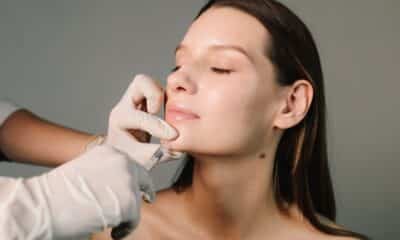According To A Guide, Acne Can Be Cured By Doing These things
Acne is a frustrating skin condition that often appears during your teenage years, but it can flare up at any point in your life. If you’re suddenly dealing with breakouts and blemishes then this first-time guide covers what you need to know about managing acne-prone skin.
Understanding Possible Acne Triggers
It’s a good idea to try and identify what’s triggering your acne and how you can deal with the cause. There are a number of different reasons and factors that can lead to breakouts, but some of the most common include:
- Changes in hormone levels due to puberty, menstruation, pregnancy or menopause
- High stress levels — this might not be the main cause but it can worsen acne

Image by Aline Ponce via Pixabay
- Diet — dairy products and high glycemic food, which can cause spikes in blood sugar levels
- Certain medications such as corticosteroids, anticonvulsants, lithium, and some steroids.
It’s not always obvious what’s causing acne, but if you’ve made any changes to your lifestyle, diet, or skincare then it could be contributing to it.
Effective Acne Treatments
There are a huge number of different treatments for acne. From creams and lotions to face washes, toners and acids, it can be hard to know what’s going to work for your skin. These are a few of the key treatments and ingredients that many people find effective in managing and clearing it up.
Azelaic Acid
Azelaic acid is a topical treatment that’s used to manage skin conditions like acne, and it can also help to fade acne scars. But what does azelaic acid do to your skin? It’s antibacterial, which can kill the bacteria that cause acne, helping to prevent whiteheads and blackheads from forming.
It also reduces the production of keratin skin cel-+000ls, which can block pores. As well as this, azelaic acid has anti-inflammatory properties, which can help reduce redness and irritation caused by blemishes. Overall, azelaic acid can help manage acne and prevent future breakouts, making skin healthier and smoother.
Salicyclic Acid
Products having salicylic acid can help to prevent acne. As well as you can also get rid of the blackheads and Whiteheads. It also removes the dead cells from the skin and prevents the forming of spots.
When it’s used on a regular basis salicyclic acid can reduce the number of breakouts, but it can take several weeks before you see any noticeable results.
Benozoyl Peroxide
Benzoyl peroxide is one of the best ingredients to help fight against all kinds of acne. It reduces excess oil and breaks down dead skin cells, but it also has antibacterial properties that help remove bacteria on the skin that causes acne. This means it’s another good way of treating current breakouts and preventing more blemishes in the future.

Tips For Managing Acne
Alongside using effective acne treatments there are a few other things you can do to improve your skin:
Don’t Dry Out Your Skin
If your skin is feeling oily and breaking out, it can be tempting to wash your face more frequently or use products to dry out your skin. But this can actually make your acne worse. When your skin gets too dry it can end up producing even more oil and harsh products can irritate your skin causing blemishes to flare up.
Make sure to use an acne wash for washing the face. Do this twice a day or if you came from outside and are sweaty.
It’s also important that your skin is well moisturized, even if it feels oily. Use a light moisturizer that’s oil-free so that it won’t block your pores but keeps your skin hydrated.
Keep Things Clean
Bacteria can build up quickly on things like your towels and bedding, especially pillowcases that are frequently touching your face. This can add more bacteria to your skin and cause further outbreaks. So it’s important to change your bedsheets and towels at least once a week.
You should also regularly clean your phone screen and make-up brushes and sponges, as these can also harbor a lot of acne-causing bacteria.
Avoid Picking At Spots

Image by Kjerstin-Michaela Noomi Sakura Gihle Martinsen Haraldsen via Pixabay
It can be really tempting to pick at spots and blemishes, but this will only make them worse. By touching your face and picking at them you’re more likely to spread bacteria. And popping a spot can lead to an infection or cause scarring that takes longer to heal.

If you’re suffering from acne for the first time then there are plenty of steps you can take to improve your skin and reduce future breakouts. But it’s important to remember that there are no quick fixes, so focus on getting into a good skin care routine and give any acne treatments time to work.
Featured Image by cottonbro via Pexels
















